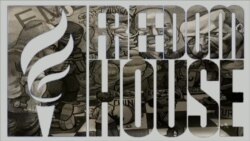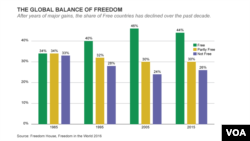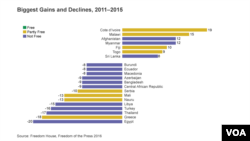Freedom of the press declined across the globe last year to its lowest point in more than a decade, a Washington watchdog group has concluded.
Freedom House, which advocates for the expansion of freedom and democracy around the world, said in a new report Wednesday that only one in seven people across the globe lives in countries where coverage of political news is robust, journalists' safety is guaranteed, there is minimal state intrusion in the media's affairs and the media are "not subject to onerous legal or economic pressures."
Jennifer Dunham, the report's research director, told VOA that authoritarian rulers and terrorist groups throughout the world are cracking down on journalists' independent reporting, while jailing, abusing and killing reporters who dare to write and televise reports at odds with official government edicts, or expose corruption. Other countries, like China, she said, limit access to certain internet sites that might reflect badly on the government in power.
She blamed deteriorating global press freedom on the "heightened level of violence against journalists" and the increased partisanship and polarization of media outlets around the world, with many journalists forced by governments and insurgent groups to take sides in armed clashes or by powerful media groups looking out for their business interests.
Post Arab spring
Dunham described the split between conservative and liberal media in the United States as a "mild example" of partisanship. But, she said that in Egypt, President Abdel Fattah el-Sisi "is putting a lot of pressure on journalists to report favorably about the government and against the Muslim Brotherhood, so much so that it's practically stamped out any dissenting voices and even in the state and private media, all are really putting forth a pro-Sisi narrative."
She said that in Syria, where at least 14 journalists were killed last year, and Iraq, "We see reporters having to risk their lives to get any kind of news whatsoever.”
Dunham said authoritarian governments are fearful of being overthrown and, as a result, clamp down on the freedom of the press. Dunham cited the spontaneous Arab Spring protests, starting in late 2010, that ousted governments in Tunisia, Egypt and eventually Libya as examples of freedom of speech and the press that had far-reaching effects.
"They all had very repressive media environments," she said, "but with the power of social media, the power of discussion, spreading information, they were able to organize and topple these leaders that had been in power for decades and I think they are really afraid of people rising up and really talking to each other, hearing about... talking about what's going on, talking about how unhappy they are and getting together and... just organizing and rising up against them."
In Mexico and Central America, Dunham said journalists face retribution for writing about drug cartels controlled by organized crime syndicates and protected by local police.
"There's really no investigation of attacks on journalists in those areas," she said. "So you have no choice but to not publish the story or to publish the story and basically risk your life."
Ten worst
The report said there is no "free press" in 50 of the 199 countries it tracked throughout the world. It labeled the 10 worst as North Korea, Turkmenistan, Uzbekistan, Crimea, Eritrea, Cuba, Belarus, Equatorial Guinea, Iran and Syria.
Dunham described North Korea and Turkmenistan as "vastly worse than someplace like a Iran or Cuba where there are kind of stirrings of popular discussion. Someplace like North Korea or Turkmenistan, the people have no access to the Internet, they are completely dominated by state propaganda, by narratives ((of)) the personality of the leader. They really have no access to news from the outside world and there's really no Independent media at all in those countries."
The Freedom House report said the worst decline in press freedom last year occurred in the tiny Pacific island nation of Nauru, because it started assessing thousands of dollars in fees against journalists wanting to enter the country or blocking their entry altogether, apparently an effort to keep them from writing about migrants being held there who are seeking asylum in Australia.
Bright spots
Dunham said there are few favorable reports of increasing press freedom across the globe, but cited two countries, Sri Lanka and Burkina Faso, as moving to ease restrictions on journalists.
She said that after a new government took over in Sri Lanka in early 2015, there were fewer threats and attacks aimed at journalists and blocks against internet websites were lifted. In Burkina Faso, officials dropped prison sentences as a punishment for libel and state interference in news content was curtailed.
Dunham said that even as governments and armed insurgencies crack down on journalists and their reporting, "a bright spot in all this is really the resilience of journalists and bloggers in continuing to report in really repressive situations. She said that in Raqqa, the self-declared Islamic State capital in northern Syria, there is a collective of journalists and bloggers who gets news out to the world.
















